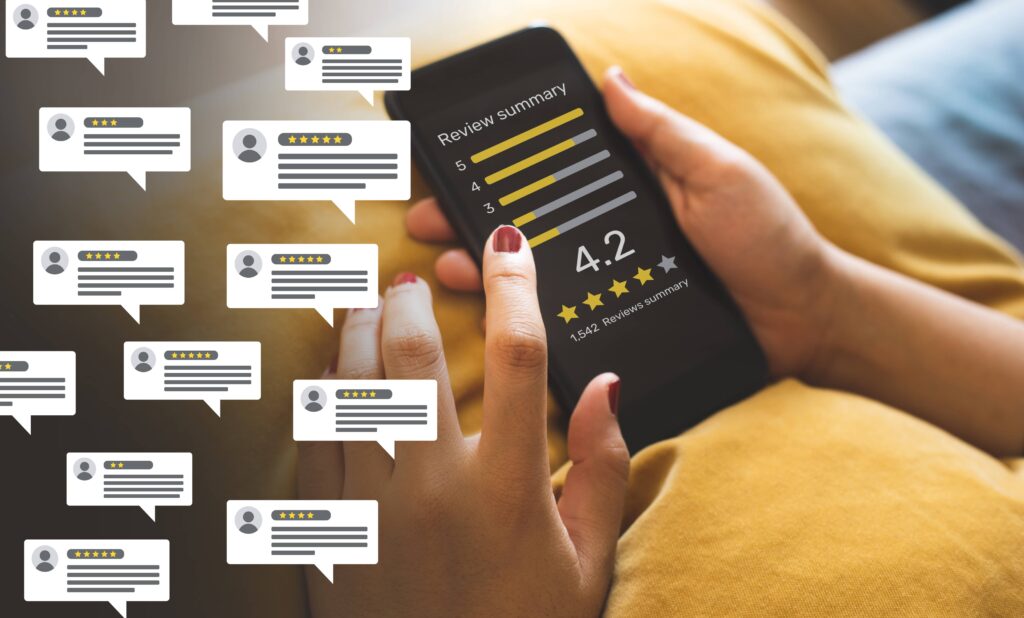Feedback. It’s got the power to make us both celebrate and wince. In modern eCommerce, you’re going to collect customer reviews whether you ask for them or not – so putting them to your advantage, to sell more products, is a good idea.
Read on to explore how product reviews can shape purchasing decisions, influence brand perception, and serve as a valuable tool for retailers and brands across the eCommerce landscape.
Why are customer product reviews so important in eCommerce?
Consumers love product reviews because they provide security. They’re the evidence that a shopper needs to understand whether the product or service they’re interested in is right. As consumers, we are increasingly time poor, and though websites continue to improve the customer experience, consumers prefer information that allows them to differentiate a certain branded bag, a dress or a steam iron from everything else on their long list. Reviews help them to do this quickly, making it easier to access third-party opinions.
Why are positive product reviews so valuable for eCommerce marketing? And what makes a good review?
Reviews also provide credibility and authenticity. Retailers that take an active part in the feedback process are seen to be honest and transparent. This can be done by welcoming 360-degree feedback alongside other forms of insights from influencers and experts. To most shoppers, a 5-star review placed by the retailer is fairly obvious to spot, and most consumers will weed these out. They’re not worth it in terms of the brand damage and loss of trust, so avoid the temptation.
Volume is also important. The more reviews the better! Consumers are unlikely to buy after reading a single review, they’ll read several and pay attention to the aggregated score across a number of reviews, meaning that you’ll want to build up a bank of advocates over time. A 4.6/5 score from 235 reviews over six months is much stronger than a 4.6/5 score from five reviews over two weeks. 2022 Statista research showed that 62% of consumers believed that online customer reviews were helpful, and expected to see a significant number of reviews when looking at a product online, with the average number of expected reviews was 112.
Third-party positive opinion is generally rated more highly than your own marketing messages, and, when customer reviews are positive, they help to sell products better than any of your own website copy or smart imagery ever could. Social media make searching for product (and supplier) feedback easy, and Google has taken this a step further by routinely publishing business reviews in SERPs and Knowledge Panels. Third-party data is arguably one of your most important pieces of product marketing because people tend to trust these sources the most.
According to Whitespark’s 2023 Local Search Ranking Factors survey, consumer reviews make up 16 percent of the overall rank of a website’s search potential. Reviews increase web traffic activity, and that in turn affects product search rankings. Reviews also lend themselves to simple visual representation via coloured star charts to attract consumer attention and encourage product consideration. Or your branding might lend itself to ranking products according to their review ratings.
Why you should always read your customer’s product reviews
- To measure quality of a product. Real customer feedback provides valuable insights for both consumers and retailers. Positive reviews build trust, attracting potential buyers, while constructive criticism helps companies identify and rectify product flaws. This two-way communication fosters a continuous improvement cycle, ensuring that products meet or exceed customer expectations, ultimately elevating overall product quality and customer satisfaction.
- To Reduce Returns. Reviews don’t have to be solely about quality, there are many more aspects they can shed light on. For example, you can invite buyers to rate a product for fit (e.g., “100% of people rated this 5 stars for fit true to size”), supporting prospective buyers who are wavering between size choices. Reviews, coupled with social proof messaging, can further increase consumer purchasing confidence and reduce potential returns. Read more on how to reduce returns using social proof messaging.
- To improve customer experience. Genuine reviews offer a first-hand account of product performance, aiding customers in informed decision-making. Positive feedback builds trust, while addressing concerns in reviews demonstrates commitment to customer satisfaction. Good and bad feedback helps overall performance if we listen to it, and are prepared to accept the good with the bad reviews. Tackling the bad can turn around a poor customer service experience, whereas fighting the criticism is dangerous. Accept feedback, to the point of saying sorry if things are below the standards you have set and use the feedback to make changes to a product or process, telling customers what you’ve done to show that you’ve listened.
- To Identify issues with, and streamline, shipping. For retailers and brands with multiple product releases each year, insight from real customers on the shipping process can be important operational feedback, to cascade throughout your business and maintain your edge. This can also be beneficial to identify and resolve any repeat issues being experienced by customers.
How to utilise customer product reviews in your eCommerce website strategy
Taggstar works with eCommerce review providers to aggregate positive, summarised shopper review data in our social proof messages. Taggstar’s partnership with Bazaarvoice, the leading provider of product reviews and user-generated (UGC) solutions, combines two powerful conversion rate optimization technologies. The integration of reviews and ratings with social proof messaging brings valuable information to the forefront and helps shoppers make more informed and better buying decisions.
As a result, retailers and brands typically see an immediate conversion rate uplift, like FatFace that saw a 1.71% conversion rate uplift in just 10 days.
Interested in learning more ? Contact Taggstar to speak with a social proof expert. We work with the largest international eCommerce brands like Debenhams, N Brown Group, Argos, Eddie Bauer, Revolve and more.



